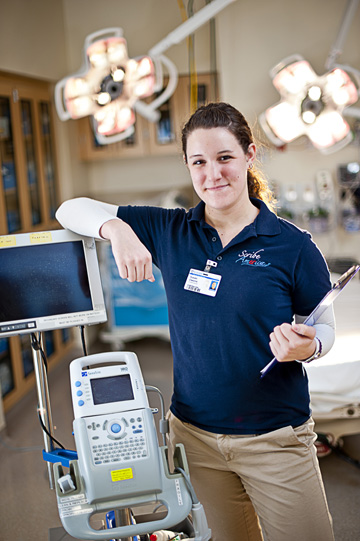Program encourages students to apply knowledge beyond the classroom

Susan Owens studies chemistry full time and works as an emergency room scribe at St. Elizabeth Hospital as she prepares for medical school. She is one of a dozen or so seniors who will graduate this spring with the College of Science's new Learning Beyond the Classroom certificate. (Purdue University photo/ Andy Hancock)
Susan Owens arrives for work at Lafayette’s St. Elizabeth Hospital late on a Monday afternoon in January. She will spend the next nine hours working side-by-side with emergency room physicians, an introduction to medicine every bit as valuable to her career plans as her work in science labs.
Owens, a chemistry major, is an emergency room scribe. Her shifts run Sundays and Mondays, from 5 p.m. to 2 a.m. and provide her with an invaluable introduction to the world she hopes to someday move through as an ER doctor.
As a scribe, she accompanies the doctors to exam rooms, records the patient's illnesses, exam, vital signs, labs and imaging studies; searches past medical records; and eventually, enters the patient's discharge plan. The work, a new field born of the move towards electronic health care records, requires a firm grasp of medical terminology and anatomy. It also takes Owens far beyond the world of the university chemistry lab or pre-med class. And this is precisely why her job in the ER fits perfectly with the College of Science's new Learning Beyond the Classroom (LBC) certificate program.
The program, launched in August 2011, is designed to encourage students to apply what they learn in the classroom to real-world situations, and, ultimately, prepare them to be well-rounded global citizens and members of the working world. Students earn points towards the 24 total required for the certificate by satisfying experience in three categories: career and professional development; service, citizenship and leadership; and experience with domestic and international diversity.
"The activities that students do outside the classroom add value to their degrees and make them unique among graduates of other universities." says Dennis Minchella, associate dean of the College of Science and one of the visionaries behind the program.
Owens is among a dozen or so students who will receive the first round of certificates this spring. They are an ambitious group with resumes that include internships, study or medical missions abroad, job shadowing, tutoring both on campus and in the community, and, work in medical and pharmacy settings. For some, the experiences have resulted in changed career or graduate study plans.
Biology major Rebecca Tweedell has used experience outside the classroom to supplement her studies since first stepping into the laboratory to do research on how a soil bacterium genetically engineers plants with biologist Stan Gelvin her sophomore year. She then interned as a quality assurance chemist at a Cargill corn mill, and a year later, with Allergan. Each experience brought her closer to a career choice.
"My time at the corn mill showed me that I am not cut out to be a quality assurance chemist," she says. "My work in Dr. Gelvin's lab helped me develop an interest in bacterial pathogenesis, but showed me I do not care for plants. I am much more interested in the human side of pathogenesis.
"I furthered this interest by researching the immunopathogenesis of dry eye disease, an autoimmune disease, at Allergan. The work showed me that I was still more interested in bacteria than in other pathogenesis processes. Each experience taught me new skills that have contributed to my career preparation."
And her next step? A doctorate in microbiology or pathology with an emphasis on bacterial pathogenesis.
Laura Starr, who coordinates the LBC program, says that kind of eye-opening experience is precisely one of the benefits of the program:
"It is one thing to know something, and another to know how to use that something. Getting students to take what they're learning and go try it out is tremendously important. Trying something out and not having to pay a penalty for failure is one of the great ways the program benefits students."
